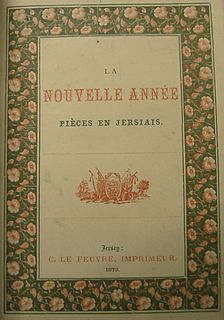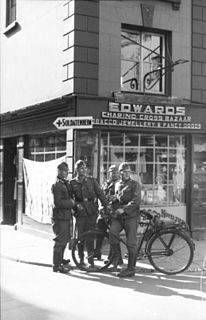
The Channel Islands are an archipelago in the English Channel, off the French coast of Normandy. They include two Crown dependencies: the Bailiwick of Jersey, which is the largest of the islands; and the Bailiwick of Guernsey, consisting of Guernsey, Alderney, Sark and some smaller islands. They are considered the remnants of the Duchy of Normandy and, although they are not part of the United Kingdom, the UK is responsible for the defence and international relations of the islands. The Crown dependencies are not members of the Commonwealth of Nations or of the European Union. They have a total population of about 164,541, and the bailiwicks' capitals, Saint Helier and Saint Peter Port, have populations of 33,500 and 18,207, respectively. The total area of the islands is 198 km2.

The history of Guernsey stretches back to evidence of prehistoric habitation and settlement and encompasses the development of its modern society.

Jèrriais literature is literature in Jèrriais, the Norman dialect of Jersey in the Channel Islands.

The German occupation of the Channel Islands lasted for most of the Second World War, from 30 June 1940 until their liberation on 9 May 1945. The Bailiwick of Jersey and Bailiwick of Guernsey are two British Crown dependencies in the English Channel, near the coast of Normandy. The Channel Islands were the only part of the British Isles to be occupied by the Wehrmacht during the war.

Alastair Layzell is an independent television producer who started his career as a reporter for Channel Television and later served nine years as a deputy of the States of Jersey, becoming President of the Home Affairs Committee, President of the Jersey Transport Authority and Vice-president of the Planning & Environment Committee.
SirVictor Gosselin Carey was born on 2 July 1871, in Guernsey, Channel Islands. He held the post of Bailiff of Guernsey from 1935 to 1946. Carey was a leading member of one of Guernsey's oldest families. In 1935, when incumbent Baliff Arthur William Bell died, Carey, who had been Receiver General from 1912 to 1935, replaced him because Procurer Ambrose Sherwill, to whom the role would have normally fallen, had only been in office a few weeks.
Paul Sanders, MA, DEA, PhD (Cambridge), FRHistS, is an Anglo-German historian and leadership scholar. He is a full-time professor in the Department of Economics, Culture and International Affairs at NEOMA Business School, Reims, France. His teaching interests lie in the areas of leadership, ethics and international affairs, and he is a commentator on Russian and European affairs.

Alexander Moncrieff Coutanche, Baron Coutanche was a former Bailiff of Jersey and member of the House of Lords in the United Kingdom.

This is a list of books in the English language which deal with Jersey and its geography, history, inhabitants, culture, biota, etc.

The Invasion of Jersey was a failed French attack on British-held Jersey in 1779, during the American Revolutionary War.

The Channel Islands Occupation Society (CIOS) is a voluntary organisation that seeks to study all aspects of the German occupation of the Channel Islands and to raise awareness and educate the public about the occupation during the Second World War. There are two branches, one in Jersey and the other in Guernsey, that take turns in publishing the Channel Islands Occupation Review. The CIOS manages many German fortifications and archives on both islands.
John George Lingshaw was a British collaborator who worked in Germany on Nazi propaganda during World War II. In 1946, he was convicted of offences under the Defence Regulations and sentenced to 5 years' penal servitude.
Robert Woodward "Bob" Hathaway was jure uxoris seigneur of Sark from 1929 until his death. An American by birth, his rule spanned the reigns of four monarchs: George V, Edward VIII, George VI and Elizabeth II.
The history of the Jews in Guernsey dates back to well before the events of 1940-5. A London Jew named Abraham was described in 1277 as being from "La Gelnseye" (Guernsey). A converted Portuguese Jew, Edward Brampton, was appointed Governor of Guernsey in 1482.

During the German occupation of the Channel Islands, there was limited resistance. The islands had a very high number of German soldiers compared to the civilian population, one soldier for every 2-3 civilians, which reduced options; this linked to the severe penalties imposed by the occupiers meant that only forms of non-lethal resistance were used by the population. Even so, over twenty civilians died for resistance against the occupiers.

The German occupation of the Channel Islands lasted from 30 June 1940 to 9 May 1945. During that time, the Channel Islanders had to live under and obey the laws of Nazi Germany and work with their occupiers in order to survive and reduce the impact of occupation. Given no guidance on how to behave by the British government, there were individuals who got close to the enemy and a few who undertook resistance activities. Most had no choice but to accept the changes and depredations to their lives and hope that external forces would someday remove the forces of occupation. It was almost five years before the islanders experienced freedom again.

Life as a civilian during the five years of occupation of the Channel Islands by the German army, which started in June 1940 was difficult and as the war progressed, became much harder. The winter of 1944-45 was particularly hard when food and fuel were in short supply and liberation seemed so close and yet so far away
The occupants of the Channel Islands became involved in European events of 1938–39 only as distant and worried listeners to the radio and readers of newspapers. The declaration of War by Britain on 3 September 1939 increased the concern. However, life in the islands continued much as normal. By spring 1940 the islands were advertising themselves as holiday destinations.

The Channel Islands were occupied during World War II by German forces from 30 June 1940, until May 1945. They were liberated by British forces following the general German surrender.

Louisa Mary Gould (1891–1945) was a member of the Channel Islands resistance movement during World War II. From 1942 until her arrest in 1944, Gould sheltered an escaped Russian slave worker known as Feodor Polycarpovitch Burriy on the island of Jersey. Following a trial, she was sent to the Ravensbrück concentration camp where she was gassed to death in 1945. In 2010 she was posthumously named a British Hero of the Holocaust.


















